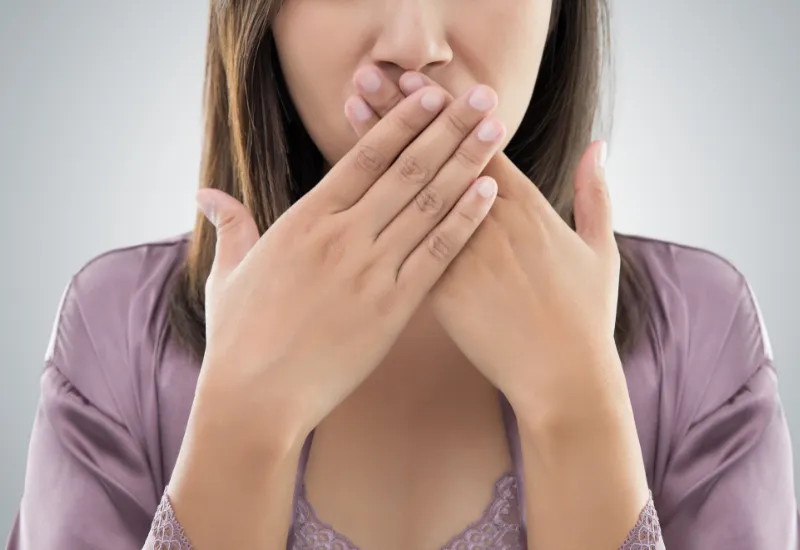You may have experienced a bad odor in your breath when you wake up in the morning. It is a natural phenomenon and happens with a lot of people. But what if you feel like you have consistent bad breath or a family member complains about it? That can be due to many underlying reasons which need to be addressed. If you want to avoid embarrassment in social settings, it is beneficial to understand what causes bad breath and how you can prevent it.
What are the causes of bad breath?
Bad breath is linked with the hygiene and overall condition of your mouth. The most common cause of bad breath is poor oral hygiene. Consider this as an analogy: You use your living space every day but fail to clean it or take out the trash. The waste materials go through biodegradation and release a bad odor in your living space unless you clean it. A similar mechanism happens within your mouth. Lack of proper brushing can increase the number of plaque deposits around your teeth and on the surface of your tongue. This can result in a bad breath that you or a close family/ friend can feel.
Plaque accumulation can also cause caries and gum diseases. You can have bad breath due to a mouth infection, sinus infection, or even a common cold. The presence of these conditions can increase the risk of bad breath. Few other medical conditions, such as chronic sinusitis, gastroesophageal reflux disease (GERD), etc., can also be contributing factors.
Some food substances can also cause temporary bad breath, such as garlic, onion, etc. A high intake of coffee or alcohol can be risky too, especially if done early in the morning without brushing your teeth. Smoking can also affect the quality of your breath.
Our mouths are naturally filled with bacteria, most of which are pretty harmless. These bacteria thrive and feed on residual food particles because of the warmth and moisture in our mouths. This process creates a smelly waste product that causes bad breath. Developing a tongue coating is another common cause of bad breath in toddlers and youngsters. Bacteria, food, and disintegrating skin cells often cling to the back portion of the tongue. If you can imagine, these things don't smell pleasant as they decompose.
There are also times when you may feel like you have bad breath, but you actually don’t. This is known as pseudo-halitosis. Having a consistent bad odor is subjective even when you have a clean oral cavity and no other disease. It is better to ask for reassurance from a dental health professional in this case.
You can check yourself if you have bad breath by licking the back of your wrist and smelling it. However, it is not a reliable technique. In a professional setting, a device called a heliometer is used for this purpose. Other diagnostic tests can include the BANA test and gas chromatography.
How can you prevent bad breath?
Bad breath can become a reason for social anxiety and embarrassment if it persists. The good news is that there are many ways by which it can be managed and prevented in the future.
- Brush regularly: You must brush your teeth twice a day so all the food debris can be cleaned out regularly. Gently scrape your tongue as well while brushing to avoid plaque formation.
- Flossing: Dental floss can help clean the areas that are often missed while brushing between your teeth. It also helps in preventing gum diseases.
- Use of mouthwash: Mouthwashes can help reduce bad breath by thorough cleaning. However, consistent use of mouthwashes should be avoided.
- Reduce smoking: Excessive smoking can cause bad breath and dry mouth. If you can quit smoking, it is the best option. If that is difficult, limit smoking as much as you can.
- Limit caffeine and alcohol intake: Caffeinated products and alcohol should be taken in a limited amount. Excessive intake does not only cause bad breath but can be damaging to your overall health.
- Avoid pungent-smelling food: Eating foods with a lot of garlic and onion can cause temporary bad breath. Avoid these foods, especially before a social gathering or meetup.
- Drink more water: Keep yourself hydrated at all times. Lack of water can lead to dry mouth, which may contribute to bad breath.
- Visit your dentist: Schedule dental checkups twice a year if possible. It can help is eliminating the causes early and avoid future complications.
Even if it is only a subjective feeling, it is better to open up to your dentist about it to get proper counseling. If you have persistent bad breath on a daily basis, don't ignore it; it could be a symptom of something much more serious. If you want to get rid of it as soon as possible, schedule an appointment with your dentist, and your breath will be minty fresh in no time.












